By Vivian P. and Joseph M. Bright
For the past 30 years the young men of the West have received one universal message from politicians on the left and right of the mainstream:
“Shut up, step aside, and let others take the stage.” Young men have been told they are surplus to civilizational requirements. It’s an incredible shame.
This constant rather droning anti-masculine message, often laced with spite and even misandrist hatred, is being refreshed yet again by the Labour Party in the United Kingdom. The Labour government of Keir Starmer is cobbling together a strategy to combat “toxic masculinity” and the UK’s Secretary for Education, Bridget Phillipson, has said that the government must “combat” a “generation of misogynists.”

Of course, they blame Andrew Tate for many of the developments among young men, but really they are using Tate to perpetuate their decades old crusade against men.
At best the left view men as a non-important group to ignore while at worst they diagnose masculinity and “maleness” as a pathological disease in need of curative intervention. This is reflected in the across the West. Kamala Harris’ failed presidential campaign was famously attached to a campaign ad titled “Man Enough” that reduced masculinity to a performative art based upon eating rare steak, deadlifting, and the ability to rebuild an engine.
What this ad did not do was speak to the urgent and varied political priorities and social issues facing men in the United States. Instead at the halfway point it turned into an ad about how men are supposed to be man enough to support various women’s issues. Unsurprisingly the ad resulted in significant backlash and the Harris campaign attempted to disown it.
The left is not alone in its abandonment and condescension toward young men, though. On the right the Republican Party in the States, Tories in the UK, and CDU in Germany have largely insisted that men shut up, man up, and take the socioeconomic punches with a stoic silence. Men have taken the punches in relative silence for decades at this point, and yet these “right-wing” parties also engage in the blame game against young men.
The Republican party blames the marriage crisis on young men and attacks young men who offer a nuanced opinion on the matter. A topic covered by Scott Greer in magisterial fashion here.
And before we get lambasted, we am not suggesting women are solely or even primarily to blame for the marriage crisis. In fact, we think the trends of atomization, individualism, and the institutional push for women to disregard their personal preferences for family life and instead focus on a career are the primary culprits. This has happened at the same time that traditional masculine income sources have been siphoned off in the form of deindustrialization while historically masculine institutions that once imparted significant status and prestige upon men—such as policing and the military—have been subject to feminization and diversity “reforms”.
Still, this article isn’t about the Ladies. It’s about young men. As Greer mentions in his piece, conservative heavyweight and Congressman Josh Hawley (Republican—Missouri) has written an entire book on the topic.
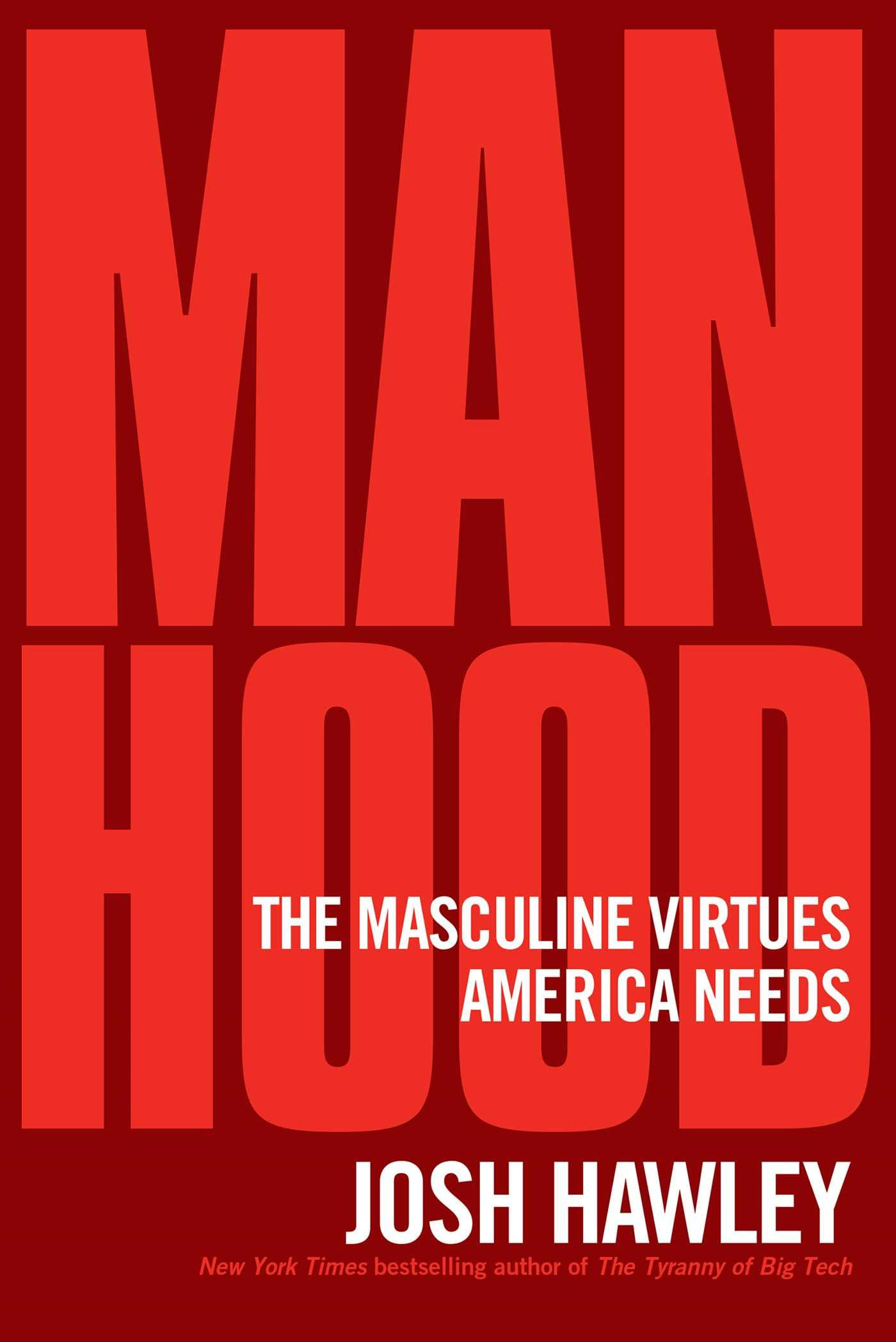
A book in which he demands young men put aside their own political interests, economic motivations, and class concerns in order to sacrifice their existence upon the alter of becoming a “good man” along the lines defined by conservative political influencers. Once again, young men are being told to ignore any stake they have in their own future to benefit others.
Much like the left the mainstream right is also deeply concerned about Andrew Tate, as Florida Governor Ron DeSantis issued a statement saying that the controversial media personality was “not welcome” in Florida.
Conservatives clearly don’t care about men’s issues either otherwise they’d understand how to combat Andrew Tate (more on this later in the piece).
All this hatred from the left and badgering from the mainstream right has come to naught, however. The rise of so-called far-right parties—which are in fact nationalist parties—across the West is also giving rise to an increasingly confident youthful and engaged male voter bloc that is, for the first time in three generations, asserting its own interests. After years of being told men have “no right” to speak on issues such as abortion or racism young men are indeed beginning to make their voices heard.
In the United States young men lurched strongly to the right in the 2024 election. Among White male voters aged 18-29 Trump won 63% of the vote, a sharp change from the 2020 election where young White men voted for Biden by a 6-point margin. In the recent German election a full quarter of German men under 25 voted for the AfD, the highest share of any party. In France Marine Le Pen’s National Rally is by far the most popular party with the youth.
Indeed, in the United States 26% young men aged 18-24 identify as Conservative while 48% identify as moderate and just 22% identify as liberal. Among men aged 24-29 only 21% identify as conservative while 27% identify as liberal. Similar shifts are occurring in Europe where 28% of young men in Sweden voted for the “far-right” Sweden Democrats (the largest share of the age group) and another 21% voted for the nominally conservatives. In contrast 37% of young women voted for the Social Democrats and 17% for the Left party.
So, what do these increasingly right-wing young men believe?
Well, according to the data young men believe that their society is in serious danger from various forms of social liberalism.
A 2022 survey by the SPLC found that 57% of young Republican men and 42% of young Democratic men view transgender people as a threat to children. Far higher than any other group save that of Older Republican Women who are also deeply concerned about transgenderism.
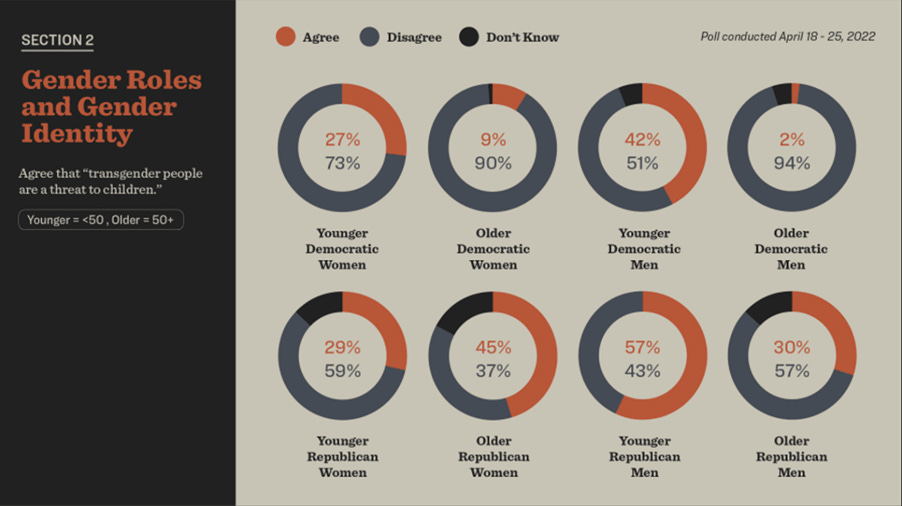
These same young men are also concerned that “gender ideology” (a far nicer way to say LGBTQ etc ideas) is corrupting the culture. Some 67% of young Republican men and 47% of young Democratic men are worried about this, more than any other group across the two parties. Once again, they are joined in their concern by older Republican women.
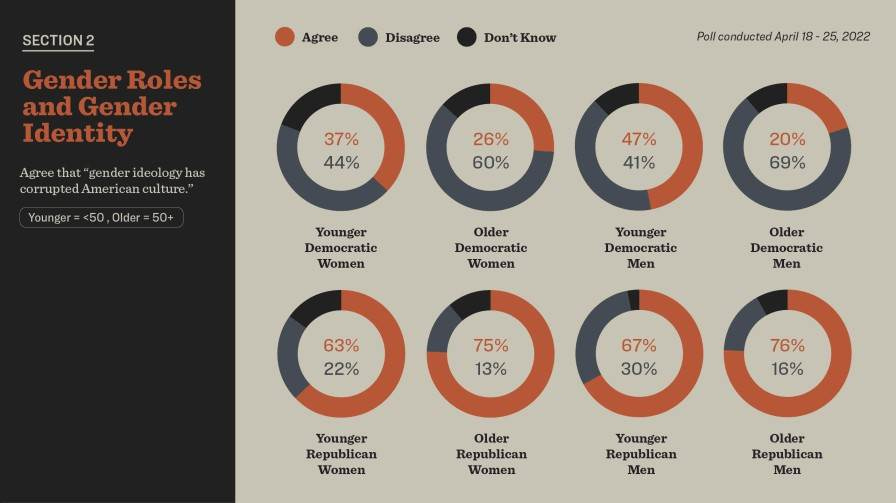
And then there is the social ill of modern third and fourth wave feminism. 62% of young Republican men and 46% of young Democratic men agree that “feminism has done more harm than good” by far the largest share of any group. Older men, the fathers and grandfathers of the younger generation, feel that feminism has been if not more beneficial than far less of a problem. Once again the mothers of young men, older Republican women, are more in agreement with than sons than their husbands. Some 51% of older Republican women view feminism as harmful (compared to 42% of older Republican men) and even 10% of older Democratic women view feminism as harmful (compared to just 4% of older Democratic men). Another survey, carried out in 2023 by the Brookings Institution, shows that just 43% of Gen Z (under 28 year old) men would describe themselves as feminist while 52% of Millennial men and 61% of Gen Z women identify as feminist.
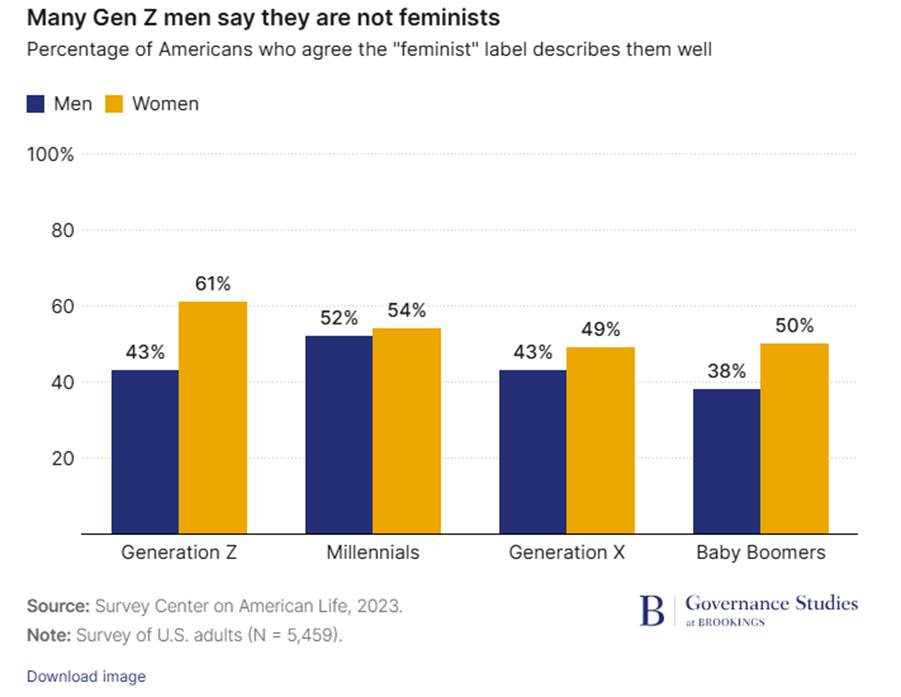
And then there is the Great Replacement. 63% of young Republican men and 54% of young Democratic men believe that the demographic changes in the United States have been carried out purposefully to “leverage political power by replacing conservative White voters.”
This position is also shared with older Republican women (71%), older Republican men (71%) and younger Republican women (61%).
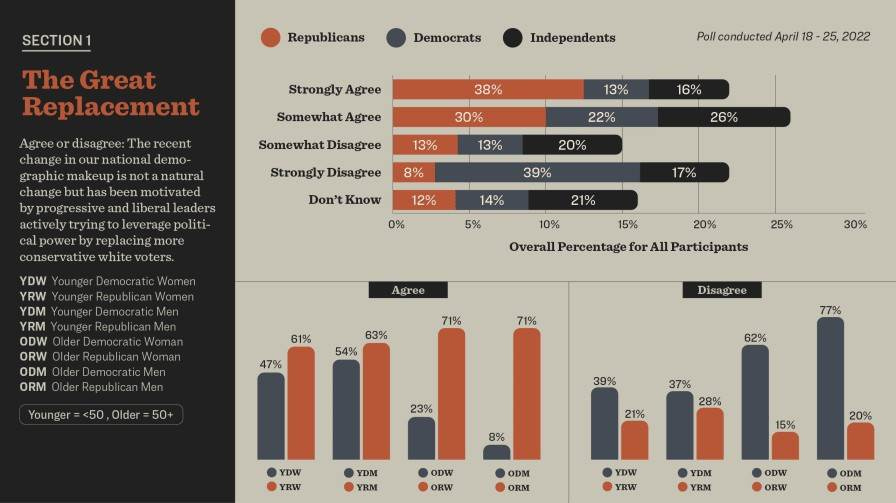
All of this is fertile ground for nationalist politics. It is nationalism that can offer these young men a way ahead. In short, young men are a foundational constituency of nationalism and they should be treated as such. This of course brings up the inevitable issue of current “influencers” and their effect on masculine concerns.
Andrew Tate is the most obvious candidate for attack by both the mainstream left and right, but what they fail to recognize—and what nationalists must recognize—is that Tate is not popular because of his distasteful online brothels, radical Islamic faith, or penchant to say the outlandish. Mr. Tate is popular because and he, a rich well to do man with status and some degree of prestige, leans into his microphone and tells young men that they matter, they have potential, and he cares about them being able to fulfill that potential. This is something the mainstream categorically refuses to do.
Still, we cannot rely on Mr. Tate to be the guiding light for young men and instead we should seek to unseat him from his current position. Nationalism and national-conservatism can do this by presenting young men with a basket of reforms that speak to their concerns. Young men have been left behind economically, socially, in terms of education, and in their mental health. White Papers has proposed policies to address these issues and national-conservative political parties would be well-advised to integrate “Male Youth” policies into their platforms.
We must also seek to remind young men, very publicly, that their contributions to society are significant and appreciated. It is still men who—by very significant margins—patrol our streets, transport our food, keep our lights on, pick up the rubbish bins, and fight our fires. Instead of attempting to feminize these institutions we should and must double down on their honorable masculine nature.
Young men cannot achieve this revolution on their own, however. The female co-author of this piece, Vivian P, has suggested that women can take a stand for men by using their significant voting power to push male concerns into the light. Men having jobs, quality education, and opportunities to advance is as important to women as it is to men themselves. This is likely why older conservative women are so concerned with issues like feminism, mass immigration, and LGBT nonsense. They are able to see the hurdles their sons face in the modern era and they must translate that sympathy into influence at the ballot box. It is also possible that by setting this example older women can pull younger women into a more rational politics and aware from the radical left.
This should not be controversial, either. A majority of both men and women in the United States want men to be the primary breadwinner while in the United Kingdom 71% of young men believe they have a responsibility to be the primary breadwinner.
There is also a strong desire for masculinity among women which can and should intersect with the innate male desire to have something worth building and protecting. A recent Institute of Family Studies research piece reveals that women who are married to protective, masculine men, are much happier. 80% of women married to a “definitely” protective man said their marriage was happy one compared to just 57% of women married to a man who is not “definitely” protective. 64% of women married to protective men said divorce was not at all likely, compared to just 37% of women married to men who are not as protective.
Overall, women prefer masculine, protective, dare we say manly men. It’s time for the West to embrace a more masculine politics and to court the young men who are so desperate to bring it about.



